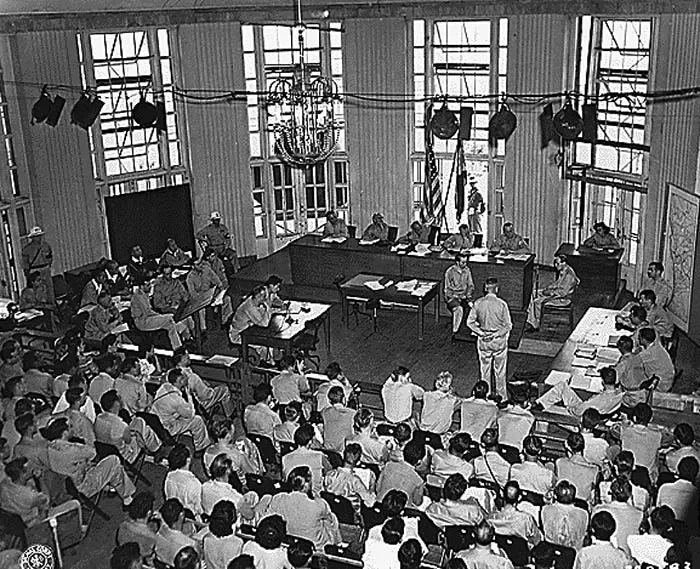Testimony of Simplicio Deomampo on Japanese Atrocities Committed in Taal, Batangas in 1945
[TRANSCRIPTION]
This page contains the testimony of Simplicio Deomampo on Japanese atrocities committed in the town of Taal, Batangas in 1945. The pages contained herein are now declassified and were part of compiled documentation1 of war crimes trials conducted by the United States Military Commission after the conclusion of World War II. This transcription has been corrected for grammar where necessary by Batangas History, Culture and Folklore. The pagination is as it was contained in the original document for citation purposes.
 |
| Photo taken during the war crimes trials in Manila. Image credit: U.S. National Archives. |
[p. 1652]
SIMPLICIO DEOMAMPO
DIRECT EXAMINATION
A (Through the Interpreter) Simplicio Deomampo.
Q Where do you live?
A Cubamba.
Q Were you in Cubamba on the 16th of February, 1945?
A I was in Cubamba.
Q What happened that morning?
A I heard firing.
Q What did you do, then?
A I hid in a tree.
Q You weren’t with Juan Vergara, were you?
A No.
Q Alright. What happened after you hid in the tree?
A I heard [the] Japanese, four of them. I had companions. One was killed by the Japanese.
Q Were you injured?
A No.
Q Then, at about 5 o’clock that afternoon, did you return to your house in the barrio?
A I returned and I saw all the houses burned down and about 50 persons were burned.
Q How did these 50 persons that you saw in the barrio meet their deaths?
[p. 1653]
Q And you testify that the 40 houses in the barrio had also burned; is that right?
A 40 houses were burned.
CROSS EXAMINATION
A In the tree.
Q And you ran to the three the minute the firing started; is that correct?
A Five of us went at one time.
CAPTAIN REEL: Will you read the question to the witness, please?
(Question read.)
THE WITNESS: Yes, that’s correct.
A Because the Japanese would kill me.
Q When you heard the firing, did you see any Japanese?
A I saw but I cannot assert the number.
Q Did you see any Japanese before you left your home and went to the tree?
A Four Japanese with many more companions went to us.
Q Did they come into your house before you went to the tree?
A I don’t know.
[p. 1654]
A The Japanese saw us in the tree.
Q Yes, but could I have an answer to the question? Did the Japanese see you in the house before you went to the tree?
A I do not know whether the Japanese went to my house or not.
Q As a matter of fact, you expected to hear some firing at about 8 o’clock in the morning of February 16th, didn’t you?
A I heard firing.
CAPTAIN REEL: Will you please repeat the question? And repeat it to the witness after the reporter gives it to you.
(Question read.)
Q (By Captain Reel) As a matter of fact, — strike that. Were you surprised when you heard the firing?
A Yes. I was surprised and ran away.
Q Didn’t you know before the morning of February 16th that at about 8 o’clock in the morning, there would be a guerrilla attack and you were to run out of the house and hide?
A No.
Q Wasn’t that generally known in the town?
CAPTAIN PACE: I object to counsel pursuing this. The witness said he didn’t expect it and he said that he was surprised when he heard firing.
GENERAL REYNOLDS: The objection is sustained.
[p. 1655]
CAPTAIN REEL: No further questions.
CAPTAIN PACE: Thank you very much.
